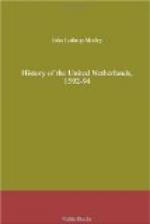And thus through the whole of the two memorable campaigns made by Alexander in France, he never failed to give his master the most accurate pictures of the country, and an interior view of its politics; urging above all the absolute necessity of providing much more liberal supplies for the colossal adventure in which he was engaged. “Money and again money is what is required,” he said. “The principal matter is to be accomplished with money, and the particular individuals must be bought with money. The good will of every French city must be bought with money. Mayenne must be humoured. He is getting dissatisfied. Very probably he is intriguing with Bearne. Everybody is pursuing his private ends. Mayenne has never abandoned his own wish to be king, although he sees the difficulties in the way; and while he has not the power to do us as much good as is thought, it is certainly in his hands to do us a great deal of injury.”
When his army was rapidly diminishing by disease, desertion, mutiny, and death, he vehemently and perpetually denounced the utter inadequacy of the king’s means to his vast projects. He protested that he was not to blame for the ruin likely to come upon the whole enterprise. He had besought, remonstrated, reasoned with Philip—in vain. He assured his master that in the condition of weakness in which they found themselves, not very triumphant negotiations could be expected, but that he would do his best. “The Frenchmen,” he said, “are getting tired of our disorders, and scandalized by our weakness, misery, and poverty. They disbelieve the possibility of being liberated through us.”
He was also most diligent in setting before the king’s eyes the dangerous condition of the obedient Netherlands, the poverty of the finances, the mutinous degeneration of the once magnificent Spanish army, the misery of the country, the ruin of the people, the discontent of the nobles, the rapid strides made by the republic, the vast improvement in its military organization, the rising fame of its young stadholder, the thrift of its exchequer, the rapid development of its commerce, the menacing aspect which it assumed towards all that was left of Spanish power in those regions.
Moreover, in the midst of the toils and anxieties of war-making and negotiation, he had found time to discover and to send to his master the left leg of the glorious apostle St. Philip, and the head of the glorious martyr St. Lawrence, to enrich his collection of relics; and it may be doubted whether these treasures were not as welcome to the king as would have been the news of a decisive victory.
During the absence of Farnese in his expeditions against the Bearnese, the government of his provinces was temporarily in the hands of Peter Ernest Mansfeld.
This grizzled old fighter—testy, choleric, superannuated—was utterly incompetent for his post. He was a mere tool in the hands of his son. Count Charles hated Parma very cordially, and old Count Peter was made to believe himself in danger of being poisoned or poniarded by the duke. He was perpetually wrangling with, importuning and insulting him in consequence, and writing malicious letters to the king in regard to him. The great nobles, Arschot, Chimay, Berlaymont, Champagny, Arenberg, and the rest, were all bickering among themselves, and agreeing in nothing save in hatred to Farnese.




